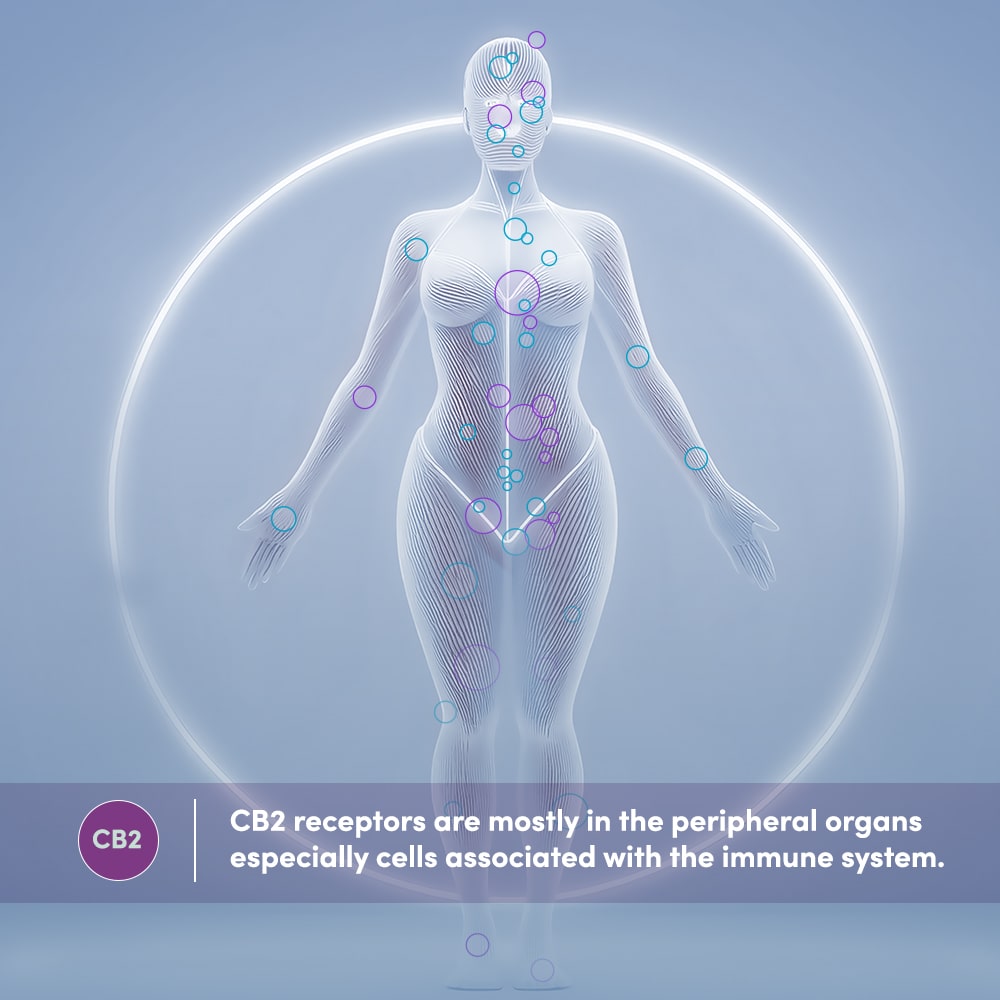
By: Saadia Shahnawaz, MD
Medical Director
Research has shown a complex interaction between the Endocannabinoid System (ECS) and the immune system, emphasizing the ECS’s role in regulating immune responses and preventing excessive inflammation that can lead to tissue damage. By modulating these responses, the ECS offers potential as a therapeutic target for immune-related diseases. Ongoing research continues to explore how targeting the ECS could help restore immune balance and provide new treatment options for conditions characterized by chronic inflammation and immune dysfunction.
The endocannabinoid system (ECS) is an often-overlooked regulatory network within the body, playing a significant role in maintaining homeostasis across various physiological systems, including the nervous, cardiovascular, and immune systems. The ECS is composed of endogenous cannabinoids (endocannabinoids), cannabinoid receptors, and the enzymes responsible for their synthesis and degradation. Over the past few decades, extensive research has revealed a complex interplay between the ECS and the immune system, highlighting its potential in modulating immune responses and offering new targets for therapeutic intervention in immune-related diseases.
The main components of the ECS include the endocannabinoids anandamide (AEA) and 2-arachidonoylglycerol (2-AG), and the cannabinoid receptors CB1 and CB2. While CB1 receptors are predominantly expressed in the central nervous system and are associated with neurological functions, CB2 receptors are primarily found in immune cells such as macrophages, B cells, and T cells.1 This distribution suggests a key role for the ECS in regulating immune responses.
The interaction between the ECS and the immune system is multifaceted. Cannabinoid receptors, particularly CB2, are involved in the regulation of immune cell migration, cytokine production, and overall immune response. Activation of CB2 receptors has been shown to exert anti-inflammatory effects, primarily by inhibiting the release of pro-inflammatory cytokines such as tumor necrosis factor-alpha (TNF-α), interleukin-6 (IL-6), and interleukin-1 beta (IL-1β).2 This anti-inflammatory action is critical in regulating immune responses that if unchecked can lead to tissue damage and chronic inflammation. Additionally, endocannabinoids like 2-AG can modulate the activity of immune cells. Specifically 2-AG has been shown to promote the apoptosis of activated T cells, which is a key mechanism in resolving inflammation and preventing autoimmune reactions.3 The ECS has been also implicated in the regulation of immune cell trafficking, with endocannabinoids influencing the migration of immune cells to sites of inflammation or injury. This contributes to the immune system’s ability to respond to threats from pathogens.

Another crucial aspect of the ECS’s role in immunity is its involvement in maintaining immune tolerance, particularly within the gastrointestinal tract and other mucosal surfaces. The ECS has been found to regulate the balance between pro-inflammatory and anti-inflammatory signals, helping to maintain a state of tolerance towards microorganisms while still allowing the immune system to mount an effective response against pathogens. This balance is essential in preventing conditions such as inflammatory bowel disease (IBD), where dysregulation of the immune response leads to chronic inflammation and tissue damage.4

Given the ECS’s role in modulating immune responses, there is growing interest in targeting the ECS for therapeutic purposes in treating immune-related diseases. For example, cannabinoids have been explored as potential treatments for autoimmune diseases like multiple sclerosis (MS), rheumatoid arthritis, and Crohn’s disease, where excessive inflammation and immune activation play a central role. By modulating the ECS, it may be possible to restore balance to the immune system, reduce inflammation, and alleviate symptoms associated with these conditions.5
In conclusion, the endocannabinoid system is a key modulator of the immune system, influencing everything from immune cell migration and cytokine production to immune tolerance and the resolution of inflammation. Understanding the intricate relationship between the ECS and the immune system opens new possibilities for therapeutic interventions in a range of immune-related diseases. As research progresses, the ECS may become a critical target for innovative treatments aimed at restoring immune balance and improving patient outcomes.
- Pacher P, Bátkai S, Kunos G. The endocannabinoid system as an emerging target of pharmacotherapy. Pharmacol Rev. 2006;58(3):389-462. doi:10.1124/pr.58.3.2
- Klein, T. W. (2005). Cannabinoid-based drugs as anti-inflammatory therapeutics. Nature Reviews Immunology, 5(5), 400-411.
- Pandey, R., Mousawy, K., Nagarkatti, M., & Nagarkatti, P. (2009). Endocannabinoids and immune regulation. Pharmacological Research, 60(2), 85-92.
- Massa, F., Marsicano, G., Hermann, H., Cannich, A., Monory, K., Cravatt, B. F., … & Lutz, B. (2005). The endogenous cannabinoid system protects against colonic inflammation. Journal of Clinical Investigation, 113(8), 1202-1209.
- Nagarkatti, M., Pandey, R., Rieder, S. A., Hegde, V. L., & Nagarkatti, P. S. (2009). Cannabinoids as novel anti-inflammatory drugs. Future Medicinal Chemistry, 1(7), 1333-1349.






